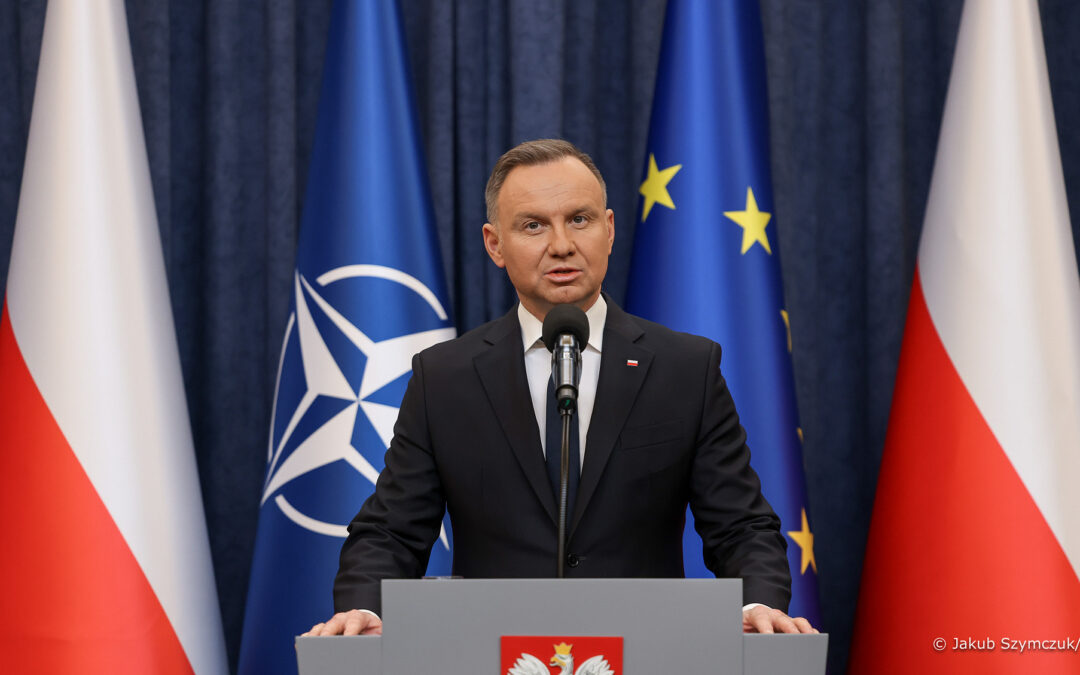Keep our news free from ads and paywalls by making a donation to support our work!

Notes from Poland is run by a small editorial team and is published by an independent, non-profit foundation that is funded through donations from our readers. We cannot do what we do without your support.
President Andrzej Duda has used the final New Year’s Day speech of his presidency to criticise Prime Minister Donald Tusk’s government, accusing it of “causing chaos”, “deepening divisions” and “weakening Polish democracy”.
The president has regularly clashed with the ruling coalition during its first year in office after replacing the national-conservative Law and Justice (PiS), Duda’s former party, which ruled Poland from 2015 until the end of 2023.
“Over the last year, there have been many disturbing signals regarding the development of our country,” said Duda, whose address is shown live by public broadcaster TVP.
As examples, he pointed to “a record budget deficit“, “delays in strategic investments” such as a new airport and nuclear power station (the schedules of which have been pushed back by Tusk’s government), and “problems in the health service”, including “the threat of hospital closures”.
“As president, I have repeatedly emphasised that these are the issues that determine the standard of living of Poles and the further development of our homeland,” said Duda. “Summing up this year, it is worth asking whether these issues were and are a priority for the current ruling coalition?”
“Unfortunately, the answer is negative,” continued Duda in response to his own question. “The [government’s] focus has been on deepening divisions and strengthening conflicts, leading to chaos in the justice system and a lack of legal security for Poles, and thus to the weakening of Polish democracy.”
Duda and the former PiS government are themselves widely seen by expert bodies, international organisations and even the Polish public to have undermined Polish democracy during their time in power.
Duda, who has served as president since 2015, will see his second and final term in office expire in the middle of this year. In May, elections will be held to choose his replacement.
In his speech, Duda said that he “deeply believes in the wisdom of my countrymen…to entrust the conduct of Polish affairs to a president who will guard our sovereignty and independence, remain faithful to the constitution, support the development of our homeland, and effectively strive for the Polish interest on the international stage”.
The president has previously said he will not formally endorse any of the candidates standing to be his successor. However, it is widely understood that he favours PiS-backed candidate Karol Nawrocki, whom Duda last month invited to the presidential palace for talks.
Dziękuję Panie Prezydencie @AndrzejDuda za miłe spotkanie i rozmowę o polskich sprawach 🇵🇱 pic.twitter.com/sHkckjQSk7
— Karol Nawrocki (@NawrockiKn) December 5, 2024
Writing for Gazeta Wyborcza, a leading liberal daily that is highly critical of Duda, Agnieszka Kublik wrote that his New Year’s speech “was not a presidential address; it was a speech by a president who has decided to take part in the election campaign as a supporter of Karol Nawrocki”.
That opinion was even shared by PiS MP Agnieszka Wojciechowska van Heukelom, who told TVP that she believes Duda “had Karol Nawrocki in mind” when speaking about whom Poles would choose as the next president.
Meanwhile, Żaneta Cwalina-Śliwowska, an MP from Poland 2050 (Polska 2050), which is part of the ruling coalition, criticised the president for making a “very politically charged speech”. She added that it was the PiS government, not Tusk’s administration, that is responsible for “the huge crisis we have now”.
Polling indicates that Poles are disappointed with @donaldtusk's government after one year in office.
This could be a problem for the main ruling party's candidate in next year's crucial presidential election, writes @AleksSzczerbiak https://t.co/GL5XAO1dYx
— Notes from Poland 🇵🇱 (@notesfrompoland) January 2, 2025
The frontrunner in polls for the presidential election is Rafał Trzaskowski, the candidate of Tusk’s centrist Civic Coalition (KO), followed by Nawrocki, who is a non-party candidate supported by PiS.
The other main candidates are Szymon Hołownia of Poland 2050, Sławomir Mentzen of the far-right Confederation (Konfederacja), and Magdalena Biejat of The Left (Lewica), which is also part of the ruling coalition.
The outcome of the election will be key to whether the government can enact its legislative agenda, parts of which have been blocked by Duda, who as president has the power to veto bills passed by parliament.

Notes from Poland is run by a small editorial team and published by an independent, non-profit foundation that is funded through donations from our readers. We cannot do what we do without your support.
Main image credit: Jakub Szymczyk/KPRP




















